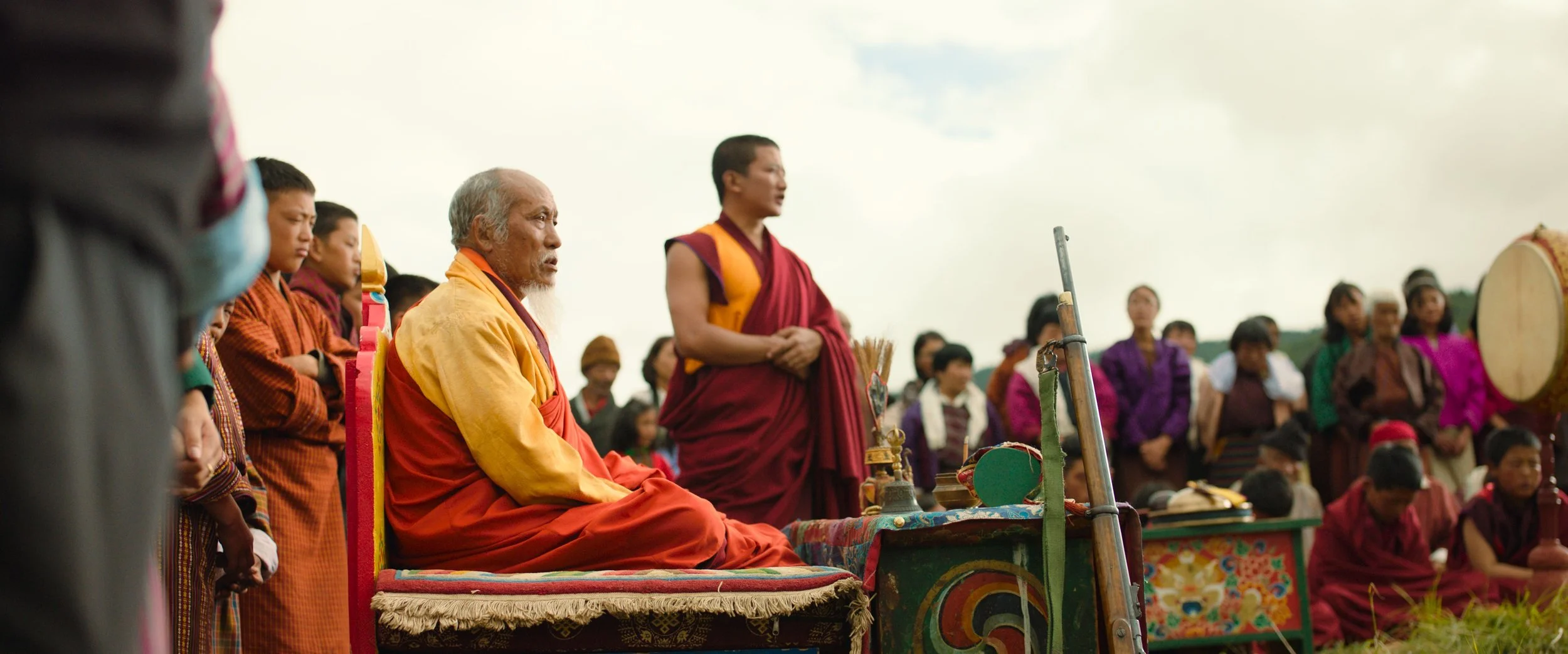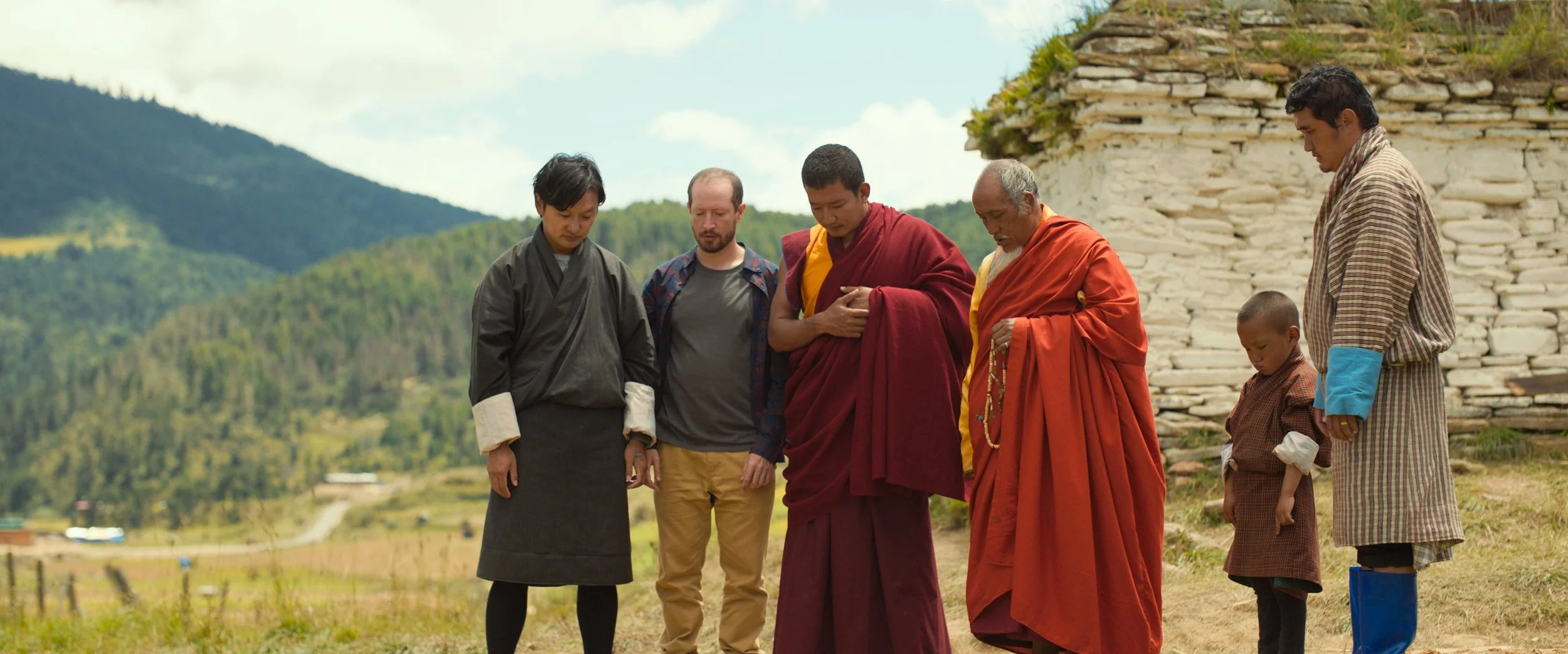Context is King
Pawo Choyning Dorji clearly doesn’t think it’s too late to make the world right. It just needs a little more Bhutan.
The MOnk and the Gun
Director: Pawo Choyning Dorji • Writer: Pawo Choyning Dorji
Starring: Tandin Wangchuk, Kelsang Choejey, Pema Zangmo Sherpa, Tandim Sonam, Harry Einhorn, Deki Lhamo
Bhutan / Taiwan / France • 1hr 47mins
Opens Hong Kong Aug 22 • I
Grade: B
In an early scene in writer-director Pawo Choyning Dorji’s The Monk and the Gun, an election registrar teaching Ura village locals about the ins and outs of voting tells them they have three choices for this mock election lesson. They can choose the blue party for happiness and equality, red for industrial development, or yellow for preservation. This suggests that in a democratic system, you can’t have all three at the same time. A quick glance at headlines from around the world supports this idea to a degree, and it’s a tension democratic states and nations have been struggling with since the Ancient Greeks. So, I guess Dorji’s right? Fuck this shit?
Context, of course, is key, and despite having an anti-democracy slant on the surface (that’s going to win the film a ton of anti-subtext fans), The Monk and the Gun attempts to be more ginger than that, and as a modest film from a country that’s had television and internet access for 25-odd years (they didn’t miss much), Dorji’s script simply lacks the filmmaking finesse to make its point in words. It does, however, do better with images. Set in 2006 when the King abdicated and told his subjects to go do their own thing, gifting them democracy (a constitutional monarchy with a parliament), The Monk is one of those “uplifting” dramas you’re not supposed to shit on. That would be mean. Bhutan is peaceful. The film industry is tiny. And the movie is fine; it’s very nice. Think Thelma. But it’s also on-the-nose, and were it not for Dorji injecting a dose of authenticity could flirt dangerously with fetishisation. Bhutan is this close to looking like a magical wonderland full of sweetly dopey peasants.
Because that’s the biggest problem with Dorji’s otherwise… er… nice (dammit!) 2019 Oscar nominee Lunana: A Yak in the Classroom. For all the points that film makes about humility and Gross National Happiness (that’s a thing), it’s got a naïve streak that’s frustrating, as well as that insufferable, sanctimonious “If only you city folk could see the true value of small town/village/rural life” attitude movies love so much. It’s the same one that new parents and reformed smokers have. Look, I’m glad you’re breeding, smoke-free. Don’t evangelise to the rest of us. There’s less of that in The Monk, and Dorji’s final piss take of gun culture is brilliant and welcome, but it’s still heavy handed in its give peace a chance vibe. That said, a little sincerity goes a long way these days.
The Monk is that classic construction that weaves together three stories that creep towards an inevitable intersection. In the first, monk Tashi (Tandin Wangchuk) goes on a mission for his master and Ura village’s Lama (Kelsang Choejey) to find two guns for him to use in a mysterious ceremony he’s cooking up for the government types coming to town in time for the full moon. In the second, tour guide Benji (Tandim Sonam) escorts an American antiquer, Ron (Harry Einhorn), as he searches for a American Civil War-era rifle that’s turned up in the mountains for some reason. Story three has elections registrar Tshering Yangden (Pema Zangmo Sherpa) trying to ensure enough people sign up for the eventual election and that Bhutan doesn’t look the backwards fool on the world stage.
Dorji leans hard on gentle humour, some of it painfully obvious, to spin his tale – one it must be said seems constructed more for viewers beyond Bhutan’s borders than within them. It’s charming to watch Tashi grow enamoured with “the hero James Bond” and enjoy some “black water” (Coke). Ron’s bafflement at his gun seller insisting that he’s offering is too much will make any market haggler chuckle. At the other end of the spectrum, we instantly fear the worst when the Lama demands guns. We instantly fear the worst when Benji and Ron have to reach out to India to seal their deal (ironically where the production had to get all its gear from). Both of those are ingrained movie responses. But Dorji is trying to link revolution-free democracy, guns and happiness on a single continuum, and it’s a tricky link to maintain. It doesn’t help that a great deal of the script is reductive, like when Tshomo (Deki Lhamo) has a short chat with Yangden. Tshomo worries about her daughter Yuphel (Yuphel Lhendup Selden) being bullied at school, because her father Phurba (Tandin Phubz) is supporting a candidate from outside Ura. Her mother and husband don’t even talk anymore. The two women debate how democracy is going to bring everyone opportunity, health and happiness, with Tshomo dropping the mic when she says, “But we were happy before.” The Monk and the Gun is easily the year’s most subjective film; DOP Jigme Tenzing’s gorgeous widescreen work is about all anyone will agree on. You’re going to feel the kumbaya of it or you won’t. But interrogating the nuances of democracy not born in flames, and how to fix broken political structures very much born in flames is a tall order to do via a devout monk that sees the world in black and white. — DEK



